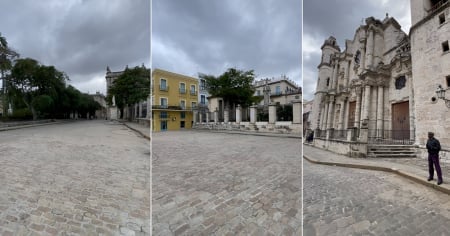The Brazilian YouTuber Marina Guaragna, known for her advocacy of leftist ideals and her passion for exploring new cultures, has sparked an intense debate on social media after deciding to travel to Cuba in response to the criticisms from her followers.
"If communism is so great, why don't you go to Cuba?" several users wrote to her, challenging her to experience the reality of the island firsthand. Marina accepted the challenge, but her experience in the Caribbean country has sparked more controversy than consensus.
In her videos, Marina, who travels with her partner Will, described Cuba as "an island that exists in the world's imagination, for both its good and bad things."
The influencer took advantage of her stay to normalize the situation in Cuba, highlighting that it is "the only socialist country in Latin America." However, her perspective was far from that of an ordinary Cuban citizen.
The YouTuber experienced her one-month trip in Cuba from the comfort of a tourist. This approach allowed her to present her followers with an idealized version of the country, without experiencing the shortages, economic difficulties, and daily struggles that Cubans face.
Marina's journey not only sparked debate about her perspective on the Cuban reality but also raised ethical questions about promoting tourism in a country where a significant portion of the population lacks access to adequate food and basic resources.
Traveling to Cuba under these conditions is filling the regime's coffers, while the people continue to face shortages," noted several of its followers on social media.
Despite the criticism, Marina took the opportunity to promote trips to Havana, presenting the Cuban capital as an exotic and cultural destination. She mentioned the availability of packages that include airfare and accommodations in four or five-star hotels, with an all-inclusive option.
He dedicated one of his videos to "debunking the claim that there is no Coca-Cola in Cuba." He explained that the beverage produced in the United States is not available due to the economic embargo, but that there is indeed Coca-Cola produced in countries like Mexico, which has trade relations with the regime.
In his video, he did not mention that thousands of Cuban children have never had Coca-Cola, as it is only sold in dollars, and their parents must prioritize money to ensure at least a piece of bread for breakfast.
She also visited a Cuban supermarket, the one in Cuatro Caminos, in Havana, where they mysteriously allowed her to record without restrictions. She was surprised to find some empty shelves, but stated that she was impressed with the quality of other products like Cuban rums.
The Brazilian tourist approach contrasts sharply with the reality of Cubans, who do not have access to the same privileges as foreign visitors and face a constant struggle for survival.
The case of Marina Guaragna has brought to the forefront the debate on the role of tourism in countries under authoritarian regimes and the differences between living as a tourist and as a citizen in Cuba.
While some of her followers applaud her attempt to break stereotypes, others accuse her of romanticizing a political system that, for many, has been synonymous with repression and poverty.
The Brazilian YouTuber, true to her style, concluded the trip by stating that everyone should experience Cuba to understand the complexity of its reality. However, the debate continues: Is it really possible to know contemporary Cuba with dollars in your pockets, staying in hotels, and not experiencing the daily blackouts?
Frequently Asked Questions about Tourism in Cuba and the Reality of the Island
Why does tourism in Cuba generate controversy?
Tourism in Cuba is controversial because some believe it supports the Cuban regime, while others see it as an opportunity to help the local economy. The discrepancy arises from the differences between tourists' experiences and the daily reality of Cuban citizens, who face shortages and economic difficulties.
How do tourists experience Cuban reality?
Tourists in Cuba often experience an idealized version of the island, enjoying hotels and services that local citizens cannot afford. The experience of tourists is very different from that lived by Cubans, who face blackouts, food shortages, and other daily limitations.
What do Cubans think about tourism on the island?
Opinions about tourism in Cuba are divided. Some Cubans see tourism as a source of income and a way to showcase the beauty of their country, while others believe that tourism masks the harsh reality faced by the Cuban people and perpetuates the current regime.
What is the impact of tourism on the Cuban economy?
Tourism is a significant source of income for Cuba, but there are criticisms regarding how the economic benefits are distributed. Many argue that tourism mainly benefits the government and certain sectors, while the Cuban people continue to face shortages.
Filed under:
